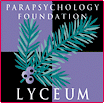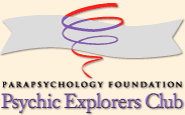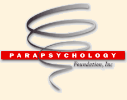 |
 |
| THE BIOGRAPHICAL DICTIONARY OF PARAPSYCHOLOGY SIGMUND FREUD Psychiatrist, foundr of psychoanalysis. B. Freiburg, Moravia, May 6, 1856; d. September 23, 1939, London, England, M.D., 1880, Vienna University; honorary LL.D., 1909, Clark University, Worcester, Massachusetts; Goethe Prize (City of Frankfurt), 1930. M. 1886, Martha Bernays; 3.d., 3 s. Editor or honorary editor of Internationale Zeitschrisft fur Psychoanalyse, Imago, International Journal of Psycho-Analysis, Revue Française de Psychanalyse. Member of International Psycho-Analytical Association, the Royal Science (London), American Society for Psychical Research; honorary member, Society for Psychical Research, London; American Psychopathological Assn. After graduating from Vienna University, Freud became a demonstrator in its physiological institute, and later assistant physician in the Vienna General Hospital, where he lectured on diseases of the nerves. In 1884 he heard of a case in which a hysterical patient was cured while under hypnosis, and the following year he went to Paris to study under the great neurologist J. M. Charcot, who was working with hypnosis in the treatment of psychological disorders. Upon his return to Vienna Freud began treating his on patients with hypnosis. In 1902 he was appointed Professor Extraordinary of Neurology at Vienna University, but continued to treat patients in a private clinic he established. Ten years after he had firt become interested in hypnosis, in 1894, Freud took the radical step of discarding hypnosis and substituting a technique of his own, which he called free association, to get the root of neuroses in his patients. Freud made many contributions to science, the principal one being psychoanalysis. This method of analyzing and treating neuroses is based on the theory that abnormal mental reactions are due to repression of desires consciously or unconsciously rejected but subconsciously persistent. Freud's method attracted many physicians, including C. G. Jung (q.v.) and Alfred Adler, both whom later broke with him over his emphasis on the importance of sexual motivation. Freud also formulated a comprehensive theory on the significance of dreams. in the course of his researchers he came in contact with various aspects of parapsychology, and his attitude wavered between the desire to believe and a lack of belief in the phenomena cited and studied. The one phenomenon he was finally able to accept was telepathy, which he felt contained the "kernel of truth" in a field which the myth-making tendencies of mankind had enveloped in a cocoon of fantasies he was unable to believe. He compared this kernel of truth to the idea that dreams really had a meaning -- another credible idea which he noted had become enveloped in a mass of unbelievable superstitions. Freud realized that his acceptance of telepathy would create further doubts in the public mind about the already suspect field of psychoanalysis, but as always when he was himself convinced of the truth of one of his theories, he did not hesitate to make his opinions known. Throughout his life he was attracted to other aspects of parapsychology, and at one time when his two closest friends were Jung and the Hungarian psychoanalyst Sandor Ferenczi both of whom were interested in the occult, Freud conducted some experiements with mediums and spiritualism. But he was never able to prove to his own satisfaction the validity of mediumistic or spiritualism phenomena. Freud's major works translated into English include New Introductory Lectures on Psychoanalysis (1933), Basic Writings (1938), General Introduction to Psychoanalysis (rev. ed., 1938), Moses andn Monotheism (1939) and Totem and Tabu (1940). See Life and Work of Sigmund Freud, by Ernest Jones (1957). Taken from Helene Pleasants (1964) Biographical Dictionary of Parapsychology with Directory and Glossary 1946-1996 NY: Garrett Publications |
 |

|
 www. parapsychology. org |
||